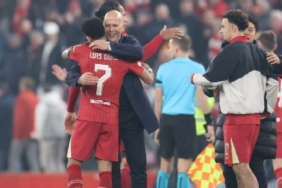Eight years ago today, we didn’t yet know that the biggest underdog story of 21st-century soccer was unfolding in front of us. Or at least, we didn’t believe it.
On Nov. 9, 2015, Leicester City was third in the Premier League table, one point behind Manchester City and Arsenal, but it was surely unsustainable. Their best win had come against a West Ham team that would finish seventh, and the best team they’d played — Arsene Wenger’s Arsenal — wrecked them at home 5-2. They were racking up points with one-goal wins over teams lower in the table and hey, good for them. But they had also recently lost in penalties to second-division Hull City in the Carabao Cup.
This was a neat story, but it was obviously going to come to an end at some point.
It, of course, did not.
The Foxes snared a 1-1 draw with Manchester United near the end of November and beat a listless Chelsea in mid-December, but it wasn’t until deep into the winter months, with wins at Tottenham Hotspur in January (1-0) and Manchester City in February (3-1), that naysayers (read: most of us) were forced to take the idea of a 5000-to-1 Leicester City title run seriously. They lost at Arsenal on Valentine’s Day and then didn’t lose again. On May 2, with two matches remaining, they clinched the title when second-place Spurs drew with Chelsea.
It was a one-time-only thing, but Leicester’s 2015-16 Premier League run will forever serve as an example that technically speaking, any bright, early underdog run could be sustainable even if the odds aren’t good. And with the 2023-24 season approaching one-third done, we still have a lot of surprising upstarts to track. Three of Europe’s five biggest leagues all have unexpected leaders at the moment — Bayer Leverkusen in Germany, Girona in Spain, Nice in France — while Tottenham Hotspur was the Premier League’s leader until this past matchday. (Are Spurs the prototypical upstart? No, but they stunk last year, so it sort of counts.)
Which of these underdog clubs (and Spurs) are ready to put something sustainable together? Which ones probably aren’t going to last until Christmas? For eight clubs with particularly impressive early surges, let’s create sustainability scores.
We’ll use two primary categories, scored on a 1-5 scale. First, we’ll look at the underlying stats they’ve produced to date — xG figures (which are more predictive than simple goals scored or allowed over time), close-game performance and other things — and whether they suggest legitimacy or, perhaps, a bit too much luck. Second, we’ll look at the roster itself. How trustworthy are each team’s best performers? Can they keep up with what they’ve been doing?
Add these two factors together, and you’ve got a maximum sustainability score of 10. So let’s talk overachievers!
Current points per game: 2.80 (first in the Bundesliga)
Last year: 1.47 (sixth)
Improvement: plus-1.33 points per game
Statistical sustainability (1-5): 4. It has been a roller coaster for Leverkusen in recent years. They finished third in the Bundesliga under Gerardo Seoane in 2021-22, began 2022-23 in persistently dismal form and fired Seoane in October, then replaced him with Xabi Alonso and ignited once more. They rebounded to sixth last year, and they’ve dropped only two points in their first 10 league outings this season.
The stats are good, but maybe not first-place good. They’re third in xG created, third in xG allowed and third in xG differential, and their finishing has been unsustainably good: They’re averaging 3.0 goals per match from just 2.25 xG, meaning they’re overachieving their shot quality by 33%. If or when that regresses, it will probably be difficult for them to fend off Bayern Munich (who are lurking only two points back) over the course of 34 matches.
At worst, however, they are in great shape to finish second. They’re already seven points ahead of everyone not named Bayern, and there’s no damning weakness to be found. Their attack is excellent, their defense mostly sound.
Roster sustainability (1-5): 4. They’ve gotten to this point mostly with known young stars doing brilliant things. Florian Wirtz (20) has three goals and four assists in league play. Jeremie Frimpong (22) has three and five, respectively.
Big things were expected of new forward Victor Boniface (22), and while he might be burning a bit too hot right now (seven goals, five assists), it’s not a surprise that he’s doing well. Throw in key veterans winger Jonas Hofmann, midfielder Alex Grimaldo and, of course, midfielder Granit Xhaka, and it doesn’t seem like this squad is overachieving a particularly large amount.
Sustainability score: 8. Again, it will be awfully hard to fend off Bayern. But unless or until the “Xabi Alonso to Real Madrid/Liverpool/wherever else” rumors become a distraction, most of what this team is doing seems particularly legitimate.
Current points per game: 2.27 (first in Ligue 1)
Last year: 1.53 (ninth)
Improvement: plus-0.74 points per game
Statistical sustainability (1-5): 4. After a bumpy start, annual Ligue 1 champion PSG has dropped just two points in the past six league matches. They’re still not in first place, however, because Nice, looking for its first French title since 1959 and its first Champions League main draw appearance since 1960 (when it was the European Cup), has been even hotter: Les Aiglons have dropped two points in their past eight league matches.
They’re ridiculously stingy, allowing the fewest shots, xG and goals. While their defensive success has been a little too good to maintain — they’ve allowed just 0.36 goals per game from shots worth 0.76 — their attack has underachieved by an almost equal amount, producing 1.18 goals from shots worth 1.48. Four matches have ended 1-0, with four more at either 0-0 or 1-1. High-flying ball, this is not, but it has worked, and it might continue to keep them in the running … for at least second or third place. A title might be a bit too much to ask for from an almost caricatured version of the Lille team that won in 2021.
Roster sustainability (1-5): 3. Even if their current defensive levels are unsustainable, the talent in the back is sturdy. Ageless center-back Dante continues to be Dante, and big things have long been expected of battery mate Jean-Clair Todibo. He has perhaps been Nice’s best player this year. Throw in the upside of young midfielder Khephren Thuram — who’s likely to command a pretty big transfer fee in the coming months (and whom Nice might have been lucky to hold on to this past summer) — and you’ve got enough upside to make a run at a Champions League bid.
Sustainability score: 7. Asking for a genuine title run might seem like a bit much, but young manager (and former Roberto De Zerbi assistant) Francesco Farioli has them playing sturdy ball, something most other high-upside French clubs aren’t doing at the moment.
Current points per game: 2.36 (second in the Premier League)
Last year: 1.58 (eighth)
Improvement: plus-0.78 points per game
Statistical sustainability (1-5): 3. Both manager Ange Postecoglou and his optimistic, aggressive Spurs have been among the brightest stories of the early season. They press, they take risks, and they score goals. But they haven’t quite been the second-best team in England: Their goal differential (plus-0.9 per game) ranks fourth, and that was the case even before they lost 4-1 to Chelsea with nine men Monday.
Spurs have overachieved their xG averages in both attack and defense and while the scoring might be relatively sustainable — their key scorer, Son Heung-min, is one of the most reliable xG overachievers in the game — their defense could implode soon. They rank ninth in shots allowed per possession, 12th in xG allowed per shot and 11th overall xG allowed, but they’ve allowed four fewer goals than the analytics suggest they should have, and they’ve won four games by one goal, with two draws and no losses. That’s the definition of unsustainability.
Roster sustainability (1-5): 3. We will now find out about Spurs’ depth and Postecoglou’s adaptability. Center-back Micky Van De Ven injured a hamstring and will be out for a bit. Attacking midfielder James Maddison took a knock, too, and appears to be day-to-day. Postecoglou has leaned on a consistent lineup thus far, with 10 players logging at least 78% of minutes in league play, so any injury is a setback.
That said, Spurs are among the richer clubs in the richest league in the world. There’s upside on the bench, and Van De Ven’s absence means a proven (if also flawed) player like Eric Dier might end up with more minutes. There are worse worst-case scenarios than that.
Sustainability score: 6. For a club like Spurs, in a league dominated by Manchester City, a top-four finish is the goal. They have a six-point lead on Newcastle, among others, but finishing top four will require quite a bit of staying power. We’ll see if Spurs have it.
Ange Postecoglou defends referees decision-making following increased pressure in the Premier League.
Current points per game: 2.10 (third in the Bundesliga)
Last year: 0.97 (16th)
Improvement: plus-1.13 points per game
Statistical sustainability (1-5): 4. The god of xG is fickle. Stuttgart had the seventh-best xG differential in the Bundesliga last season but finished 16th thanks to particularly strong finishing from opponents and an awful record in close games. They rallied just enough to avoid relegation after hiring Sebastian Hoeness as manager in April, and now they have a new lease on life. Stuttgart’s No. 3 spot in the table has been well earned: Through 10 matches, they have the second-best xG differential and fourth-best goal differential.
Dan Thomas is joined by Craig Burley, Shaka Hislop and others to bring you the latest highlights and debate the biggest storylines. Stream on ESPN+ (U.S. only).
In attack, they’re third in goals scored and second in xG generated, and in defense, they have perhaps been unlucky again: They’re allowing 1.3 goals per match (fifth) from shots worth 1.0 (second) despite a solid save percentage from Bayern loanee Alexander Nübel. Considering only 4% of opponents’ shots have been worth 0.3 xG or more (second-lowest in the league), and considering they’ve blocked 30% of opponents’ shots (fourth), that average will likely fall moving forward if they maintain this level of play.
Roster sustainability (1-5): 2. A single injury was a reminder of how fragile upstart runs can be. Newcomer Serhou Guirassy began the season with a jaw-dropping 14 goals from 32 shots in just eight matches, but he suffered a hamstring injury on Oct. 21, during a 3-0 win over Union Berlin. Stuttgart has lost back-to-back matches without him — 3-2 to Hoffenheim (forgivable) and 2-0 to Heidenheim (ouch).
Guirassy is expected back perhaps as soon as this weekend’s big battle with Borussia Dortmund. But while there are sturdy pieces here — winger Chris Führich and Deniz Undav have still formed a solid attack without Guirassy — they’re probably only a top-four threat with the Frenchman in the lineup.
Sustainability score: 6. If Guirassy gets hurt again, or if the transfer winds blow in January, Stuttgart probably will sink. But with the points they’ve stockpiled thus far, they could still be a threat to land a European bid for 2023-24, no matter what.
Current points per game: 2.58 (first in LaLiga)
Last year: 1.29 (10th)
Improvement: plus-1.29 points per game
Statistical sustainability (1-5): 2. Added to the City Football Group roster in 2017, soon after achieving promotion to LaLiga for the first time, Girona’s growth has come in waves. They finished 10th in 2017-18, but quickly sank back to the second division for three years. Back up in 2022-23, they finished 10th again. Now they’re nine spots higher than that. (For now.)
Their finishing numbers are currently even less sustainable than Leverkusen’s. Girona is averaging 2.4 goals per match from shots worth just 1.7, a 40% overachievement. Any regression in this department will likely shine a light on a shaky defense: They’re 12th in shots allowed per possession and 10th in xG allowed per shot.
To date, they have merely the fifth-best xG differential in the league. That’s a massive accomplishment in itself, but between torrid finishing, an almost perfect record in close games — five wins and a draw in matches decided by 0-1 goals — and the fact that, incredibly, they’ve played only one of the current top nine teams, inevitable regression looms.
Roster sustainability (1-5): 3. The core of contributors is a delightful mix of sturdy veterans you know in defense (center backs Daley Blind and David López, goalkeeper Paulo Gazzaniga), emerging future stars you will know (winger Sávio, fullbacks Miguel Gutiérrez and Yan Couto, a Manchester City loanee) and a couple of peak-age breakthrough players in Aleix García (three goals and four assists from 25 chances) and forward Artem Dovbyk (six goals and four assists). Considering players like Barcelona loanees Eric García and Pablo Torre haven’t been significantly involved yet, depth might actually be pretty strong.
Sustainability score: 5. In terms of vibes, this is the most Leicester-like team on the list, but the schedule is about to get infinitely more difficult. Girona does still have the inside track on a top-four finish, though — they’re currently 10 points ahead of everyone not named Real Madrid, Barcelona, or Atletico Madrid.
Current points per game: 2.00 (fifth in the Premier League)
Last year: 1.61 (seventh)
Improvement: plus-0.39 points per game
Statistical sustainability (1-5): 2. Villa isn’t one of England’s seven particularly rich clubs, but the combination of decent-sized spending and a strong coaching hire has made them awfully interesting. Since they hired Unai Emery last November, only Manchester City, Arsenal and Liverpool have generated more points.
They have posted delightful offensive numbers this season — third in goals, sixth in xG created — and forward Ollie Watkins has taken a star turn. But they’ve only played one of the four teams ahead of them in the table (Liverpool, which walloped them 3-0), and their defense has lacked.
While they’re currently fifth in both points and goal differential, their xG differential ranks seventh because a whopping 17.7% of the shots they allow are worth at least 0.3 xG — among Europe’s Big Five, only LaLiga’s Granada have allowed a higher percentage. They rank 19th in xG allowed per shot, and they’ve been a little lucky that only 37% of opponents’ shots have been on goal (16th). Slowing down big-time teams with big-time attacks will be a major struggle.
Roster sustainability (1-5): 3. If you’re going to suffer a devastating pair of injuries, you might as well do it right at the start of the season, before your rotation has completely taken shape.
Hmm. Now that I’ve typed that out, it doesn’t really make much sense, but it has worked for Emery. They lost both winger Emiliano Buendía and center-back Tyrone Mings basically the moment the season began, but Emery immediately crafted a new rotation, and 10 players have recorded at least 90% of league minutes. That’s as tight a rotation as you’ll ever see, and it makes you wonder what might happen if or when future injuries strike.
Sustainability score: 5. England gets enough spots in European competitions that Villa should remain in the hunt for one even if they get run over defensively by the league’s heavyweights. But continuing to average 2 points per game is probably too much to ask.
.jpg)
The beautiful game lives here. Stream top leagues, tournaments and teams.
Sign up for ESPN+
FRIDAY, NOV. 10 (all times ET)
• Borussia M’bach vs. Wolfsburg (2:30 p.m.)
• Athletic Club vs. Celta Vigo (3 p.m.)
• Blackburn Rovers vs. Preston NE (4 p.m.)
• NCAA: Gonzaga vs. San Diego (10 p.m.)
SATURDAY, NOV. 11 (all times ET)
• Sunderland vs. Birmingham City (8 a.m.)
• Bayern Munich vs. Heidenheim (9 a.m.)
• Almería vs. Real Sociedad (10 a.m.)
• Royal Antwerp vs. Standard Liege (10 a.m.)
• Cardiff City vs. Norwich City (11 a.m.)
• Osasuna vs. Las Palmas (12 p.m.)
• Real Madrid vs. Valencia (3 p.m.)
Current points per game: 1.82 (fourth in Ligue 1)
Last year: 1.34 (11th)
Improvement: plus-0.48 points per game
Statistical sustainability (1-5): 2. It remains one of the more remarkable stories in Europe: Will Still took over as interim manager for Reims last October, one day before his 30th birthday. Because he didn’t have a UEFA pro license, the club was fined €25,000 for every match he coached, but he also didn’t lose till March. They faded to end the season and lost prolific loanee Folarin Balogun back to Arsenal (and then Monaco). But they’ve been rock solid in 2023-24.
It might be difficult for them to remain in the top four, however. They haven’t faced either of the top two teams in the league (Nice and PSG), and third-place Monaco beat them 3-1. Their +0.26 xG differential per match ranks just ninth in the 18-team league, and they’ve mostly gone with quality over quantity. They rank 15th in shots per possession and 10th in shots allowed, but in terms of xG per shot, they’re second in both attack and defense. Over enough time, however, it’s easier to maintain a quantity advantage.
Roster sustainability (1-5): 3. While Ligue 1 is primarily known for producing bright young talent (that then leaves for other, richer leagues), Reims has zagged instead of zigging. Among their best players this season are winger Junya Ito (30), midfielder Teddy Teuma (30), and defender Yunis Abdelhamid (36), and among their top 10 minutes earners thus far, no one is younger than 25. They do have bright, younger players like forward Mohamed Daramy (21) and midfielder Amir Richardson (21), but this is an older squad in a young league.
That might prevent its core from getting picked apart by transfer vultures, though. Aiming older has worked pretty well for German clubs like Freiburg and Union Berlin lately.
Sustainability score: 5. Still is a cool story, and the experience of the roster should mean the floor remains pretty high. But it’s hard to see a top-five ceiling here.
Current points per game: 1.80 (sixth in the Bundesliga)
Last year: 1.06 (12th)
Improvement: plus-0.74 points per game
Statistical sustainability (1-5): 1. If Stuttgart has been overshadowed by Leverkusen, Hoffenheim has been overshadowed by both. But while Stuttgart surged after hiring former Hoffenheim head man Sebastian Hoeness, Hoffenheim has done the same with former Stuttgart manager Pellegrino Matarazzo. They spent most of 2022-23 under relegation threat, but surged in the spring with Matarazzo, and they’ve kept the good feelings rolling this season. They didn’t score their sixth league win until March 18 last season; this time around, they did it on Oct. 28. They haven’t scored an inordinate number of close wins, either. The wins were pretty legit.
Their four losses have been equally legit, however, and they exposed a very dicey Hoffenheim defense. They allowed 11 goals in the four losses, and they’re allowing 1.9 goals per match overall, 2.7 against fellow top-six teams. In the super-prolific Bundesliga, that still ranks a decent eighth, but they also rank 13th in xG allowed. They’re 10th in xG differential. Even with a delightful and prolific attack, it’s going to be extremely difficult to keep up with the league’s heavyweights with a defense that’s a few steps beyond porous.
Roster sustainability (1-5): 3. The goal-scoring should be sustainable. Veterans Andrej Kramaric and Wout Weghorst complement 21-year-old future (current?) star Maximilian Beier up front, and while Beier might be burning a little hot, with six goals from shots worth 3.9 xG, Weghorst is also emerging from a finishing slump of his own. And they haven’t yet gotten much from injured recent addition Mergim Berisha.
Still, the personnel at the back — veterans Kevin Vogt and John Brooks and younger players such as Ozan Kabak and Attila Szalai — aren’t among the league’s best. There’s no real reason to assume the defense will improve much.
Sustainability score: 4. With this attacking talent, Hoffenheim should continue to score and scare bigger teams. But this feels more like a team destined for a seventh- to ninth-place finish than a team with Champions League potential.












